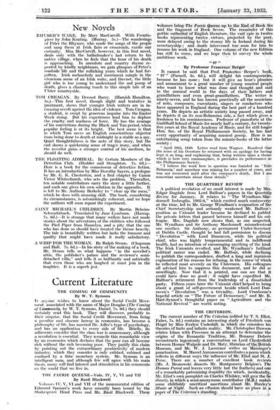THE QUARTERLY REVIEW
A political revelation of no small interest is made by is Edgar Dugdale from Lord Balfour's papers in the Quarterly Review for January. It relates to " The Wyndham-frfac- donne!' Imbroglio, 1902-6," which. excited much eontroversy at the time, led to Mr. George Wyndham's resignation of the Chief Secretaryship and seriously weakened Mr. Balfour'E position as Unionist leader because he declined to publish the private letters that passed between himself and his col- league. Mrs. Dugdale now shows that, as one suspected, Mr. Wyndham and Sir Anthony Macdonnell misunderstood one another. Sir Anthony, as- permanent Under-Secretary at Dublin Castle, thought he had full permission to diseusk " Devolution " with Lord Dunraven, while his political chief, who was highly temperamental and in indifferent health, had no intention of encouraging anything of the kind. The Irish Unionists revolted, and Mr. Wyndham's brilliant political career was ended. Mr. Balfour, while declining to publish the correspondence, drafted a long and ingenionh explanation of his reasons for refusing, in the course bf Which he reflected most severely on the 'Ulstermen. His colleagues all advised him to suppress this document, and he did se unwillingly. Now that it is printed, one can see that it could have done no good ; it might have expedited Mr. Balfour's retirement from the leadership of a dissatisfied party. Fifteen years later the Unionist chief helped to bring about a grant of self-government beside which Lord Dun- raven's " Devolution " was, a. triviality. Lord Cranborne's hopeful article on " The Future of Democracy," and Mr. R. Hart-Synnot's thoughtful paper on " Agriculture and the National Revival " are worth noting.




































 Previous page
Previous page